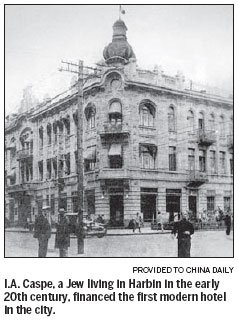Harbin’s story reads like a script
When Simon Caspe returned from his studies in Paris to his birthplace, he was set on the career path of concert pianist. The 24-year-old was tall, good-looking, wealthy, and was already getting rave reviews for his performances.
Then tragedy struck. On an August night, while dropping off his girlfriend, he was kidnapped. Half a year later, his body was recovered. His ears had been cut off and large portions of his skin were frozen off.

The year was 1933 and the place was Harbin, where Simon was born. The incident marked an unofficial end to the short-lived freedom Jews, most from Russia, enjoyed in the northeastern Chinese city, prospering as business people and getting a respite from the raging waves of anti-Semitism engulfing Europe.
For a while, there were 20,000 Jews living in Harbin, and the total number of expatriates was 10 times that figure. Harbin became a de facto haven for those fleeing upheavals in Europe, mostly in Russia.
I.A. Caspe, Simon's father, was one of them. The opening of the Chinese Eastern Railway in 1901 brought streams of migrants from Eastern Europe, turning Harbin from a fishing village into a booming town. Caspe sensed business opportunities and financed the first modern hotel in the city.
Designed in the Louis XIV style, the hotel was originally named Modern, or Madieer in Russian, and was later given the French spelling Moderne, when the family obtained French citizenship. Dignitaries who descended on the city stayed here. Now, some of them, in faded photos, smile from a gallery in the lobby. Nearby, utensils from the hotel in that era are displayed, from coffee makers to tin kettles.
If things work out as Liu Ruiqiang plans, Modern Hotel will soon undergo another major renovation, at a cost of 100 million yuan ($15.43 million) and have a Jewish management team at its helm. Liu, currently general manager of the hotel, visited Israel in 2008. "There is so much we can learn from them," he said.
Gai Ruyin, CPC Secretary of Harbin, has also paid a visit to Israel and met Benjamin Netanyahu, among other luminaries.
"Jews made a lot of contributions to Harbin. Many who lived here early last century saw it as their hometown. We would like it to be their new home - and we welcome people from all over the world to invest here or come visit. We'll re-burnish the image of our city as the jewel of northeastern Asia," Gai says.
In a sense, Harbin has discovered its cultural heritage and is playing it up in an effort to attract tourists and investors.
"Our city is very cosmopolitan and inclusive," says Liu Ruiqiang, who hires two foreign bands, one Russian and one Filipino, to play on its balcony facing Central Street.
Modern Hotel is the flagship of a conglomerate that includes a fleet of taxis, a hunting ground, and a line of food and management services. If the hotel is the jewel in the crown in the edifice that is Modern Group, the ice and snow festival and the beer festival, both held annually, are the twin pillars.
Liu is especially proud of the ice and snow show, which the municipal government started in 1999 and has been exclusively funded and managed by Modern Group since 2001.
"Even though ours is already the world's largest (ice festival), we cannot stop innovating," Liu says. "Every year we come up with a new theme. Last year, we used eco-friendly lighting that cut energy consumption by half."
Liu has grand plans. He wants to build an all-season playground and an all-French town.
"In three to five years, the number of tourists arriving will double," he adds, "and Harbin has numerous wonders to show the world."
As for the Caspe story, possibly the biggest crime drama in Harbin's history, some international filmmakers are said to be developing the project.
"They have come here for background research and location scouting," Liu says.














